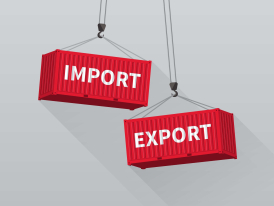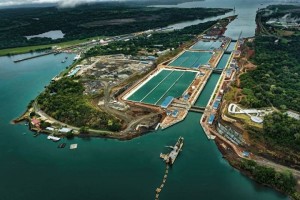Impact of U.S. Import Tariff policy on Global economy, Indonesia

importexport1-1
The import tariff policy announced by United States President Donald Trump has had a significant impact, creating uncertainty on the global economy, including Indonesia, although there is room to strenghthen the economy.
Trump has earlier set an import tariff of 25 percent for Canada and Mexico and an additional 10 percent for goods from China. This policy was originally scheduled to take effect on February 4, 2025, but Trump then postponed the implementation of tariffs for Canada and Mexico for the next 30 days.
Economist KISI Asset Management, Arfian Prasetya Aji, said that despite creating uncertainty, low domestic inflation and growth in the manufacturing sector on the other hand provide opportunities for Indonesia to continue to strengthen its economy.
"This tariff policy has triggered uncertainty in the global financial market. The U.S. Dollar Index strengthened significantly to reach 109.86, causing the rupiah to depreciate to 16,483. However, after the announcement of the tariff delay for Canada and Mexico, the rupiah strengthened again to the level of 16,371," Arfian in a statement obtained by Indonesia Business Post on Monday, February 17, 2025.
The U.S. inflation report showed a figure of 2.6 percent year-on-year (YoY) for December 2024, in line with expectations, while core inflation was recorded at 2.8 percent YoY, indicating that inflationary pressures are still quite high.
Meanwhile, Indonesian inflation in January 2025 reached its lowest point in the last 25 years at 0.76 percent YoY.
However, core inflation still grew by 2.36 percent YoY, indicating that there is real inflationary pressure. The decline in Indonesian inflation was mainly due to deflation in government-regulated prices, such as electricity tariffs, which fell by -6.41 percent YoY.
Meanwhile, Indonesia's manufacturing Purchasing Managers' Index (PMI) rose to 51.9 in January 2025, up from 51.2 in the previous month.
"This is the fastest growth in factory activity since May 2024. This increase was driven by increasing foreign demand and relatively moderate output costs. If this positive trend continues, the manufacturing sector has the potential to increase employment and support national economic growth," Arfian said.
He added that U.S. import tariffs can trigger inflation in the U.S. due to rising prices of imported goods.
"If U.S. inflation increases, the Fed is likely to maintain high interest rates, which will have an impact on limited room for interest rate cuts by Bank Indonesia (Indonesian Central Bank)," he cited.
He said further that high U.S. inflation has the potential to depress the rupiah exchange rate if the Fed remains hawkish in its monetary policy, while low Indonesian inflation provides room for Bank Indonesia to cut interest rates to encourage economic growth.
“Furthermore, the increase in the manufacturing PMI is a positive signal for the Indonesian economy. With increasing demand and lower output costs, Indonesia has the opportunity to record better economic growth this quarter,” he concluded.
Tag
Already have an account? Sign In
-
Start reading
Freemium
-
Monthly Subscription
30% OFF$26.03
$37.19/MonthCancel anytime
This offer is open to all new subscribers!
Subscribe now -
Yearly Subscription
33% OFF$228.13
$340.5/YearCancel anytime
This offer is open to all new subscribers!
Subscribe now






